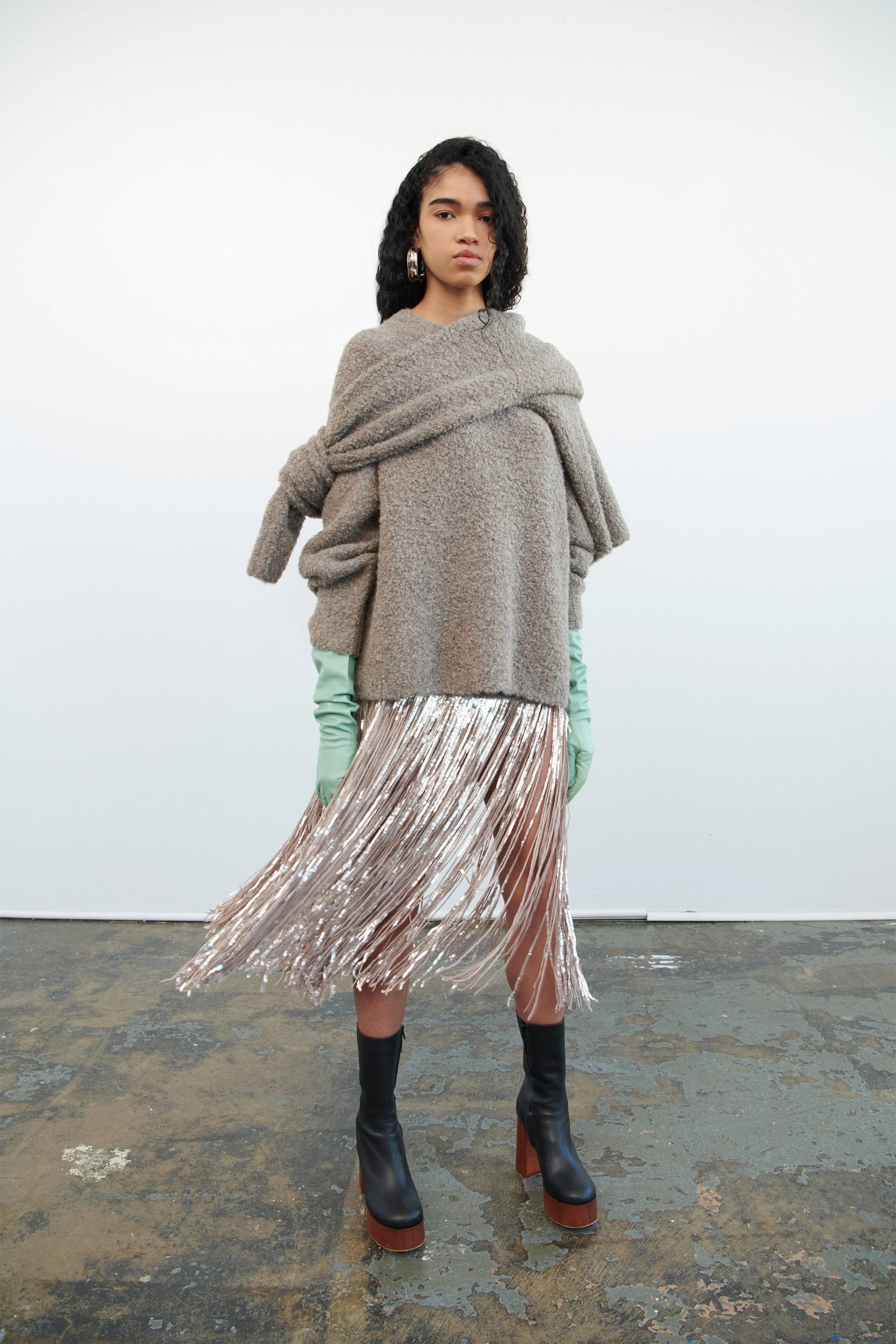My White Privilege
When I was 23, there was an Orca card that was passed among my friends from college. (An Orca card is Seattle’s version of a Metrocard. It’s a refillable card used to access buses and the light rail.) This particular Orca card was treasured. It had belonged to a friend’s brother who received it as a perk from his office job. When he left that office job, the card, with its unlimited rides, continued to work. He gave it to his sister, and she bestowed it upon friends when she no longer needed it.
In this time period, when we were all in our early twenties, working for tips so we could have time to audition, this ORCA card was golden. The little bit of money it saved us gave us breathing room, mentally and financially. It passed from friend to friend, until one day, it was passed to me. As my friend handed over the card, she also gave me a warning: the card would always work when scanned at a kiosk at the train station but, sometimes, when scanned by the security officers who occasionally boarded trains, it wouldn’t, so be prepared.
I hadn’t had the Orca card for long when, while commuting to work, the train stopped at Stadium station, and two security officers, wielding ticket scanners, boarded my car. Immediately, my heart began to hammer. Our car was half-full. In minutes one of the officers was standing in front of me. “Ticket, please,” he said, with his hand outstretched. I placed the Orca card in his palm, attempted to control my breathing, and looked casually up at him. He was white, freckled (like me), with strawberry blonde hair. He was neither tall nor short.
BEEP BEEP went the scanner.
“Miss, the scanner is telling me there is an error with your card.”
“Really? I scanned it at the kiosk and it said I was good to ride. It’s an unlimited card.” (I did my best not to outright lie, though I wasn’t being truthful, either.)
The officer paused, and I could see him silently sizing me up. He scanned from top to bottom, and finally replied, “That is really strange. There’s a customer service number you can call. I’m sure they can figure that out for you. Have a good day.”
“Thank you. You, too.”
The officer moved on. The next two riders he approached were two women, roughly my age, neither were white. “TICKETS!” he barked at them. They had both purchased paper tickets. They handed them over to him, without making eye contact. He scanned the tickets and flung them back at them, crumpled. “Here,” he said, then moved on to the next riders.
I could feel the two women’s eyes bore into me, and immediately felt covered in full-body shame. I had fooled that officer, but I hadn’t fooled them. Often, as white people, we get to exist completely oblivious to our privilege. That day, my white privilege stared me right in the face.
I knew, had I not been white, that officer would have scanned my Orca card, seen the error message, and swiftly (and, likely, loudly and dramatically) thrown me off the train. But, because I was white, dressed like Jess from New Girl and with long blonde hair, the officer didn’t throw me out. Instead, he was polite and offered guidance.
And, even if he hadn’t believed me, my experience leaving the train still would have been privileged. The officer would have said something like, “Miss, without a proper working ticket, I’m going to have to ask you to gather your things and exit the train.” I would have nodded, swiftly grabbed my work bag, and bolted out the door.
Because my exit would have been quiet, fast, and subtle, my white privilege would continue. My exit wouldn’t be an incident. It wouldn’t be something to witness. No one on the train would go home to their spouse that night and say something like, “Today on the train, some WHITE girl got thrown off for having a fake ticket. Those WHITE people are always trying to get things for free, while the rest of us have to pay higher fares BECAUSE OF THEM.” Likely, nothing I ever do will reflect poorly on my race as a whole. I’ll just be some singular woman who did something she shouldn’t have. That is a privilege.
I know that many white people balk at the term “white privilege”. The word “privilege” brings with it visions of silver spoons, large houses, and exotic vacations and that is not the experience of most people. It’s easy for white people to say, “I’m not privileged! Do you know how hard I’ve worked?” White privilege doesn’t negate hard work. Instead, it means that when things are hard, when you face challenges, they are not made harder (or insurmountable) by your race.
My audience on this blog is mostly white. I would bet that if you’re white and reading this, you’ve had an experience like mine with the Orca card. Acknowledging these experiences is uncomfortable. I’m embarrassed by what I did, and embarrassed for the preferential treatment I was given. I broke the rules. I should have been given a ticket. I should have been asked to leave the train. And you may say, “But I’m honest! I follow the rules! I’d have never done what you did!” That may be true, but still, I’m positive that at some point you made a mistake and were given a free pass, whether it be by a police officer, your boss, or even a friend. That’s white privilege in action.
On May 25th, George Floyd was murdered by the police. On May 13th, it was Breonna Taylor. In February, Ahmaud Arbery was murdered by his neighbors for jogging. These acts of fatal violence against Black people are recent, but the pattern is not. Black people have endured violence rooted in racism for hundreds of years. For hundreds of years, they’ve asked for change. Isn’t it time, isn’t it our responsibility, to help?
White readers, if you cannot join a protest, if you’re unable to donate, I hope you’ll start the process of educating yourself. We cannot be good allies, good neighbors, or good community members if we are naive. Below are articles and a book that I’ve read this week that I found helpful and enlightening. I share these articles not because I consider myself some kind of expert (I’m not), but rather because I would like to discuss them and continue learning with you. Just like admitting our privilege, it might not be comfortable, but it is needed and necessary.
You can reach me with your thoughts here in the comments, on Instagram, Facebook, or Twitter. My email address is costumeparade@gmail.com. I hope that we can become better allies together.
(One final note - please don’t burden your friends of color with this! There are plenty of resources for white education, and it’s not their job to continuously explain their experiences to white people.)
The ARTICLES
Remember, No One Is Coming to Save Us by Roxane Gay (The New York Times)
The Death of George Floyd in Context by Jelani Cobb (The New Yorker)
Performative Allyship Is Deadly (Here’s What to Do Instead) by Holiday Phillips (Forge)
How Much Do We Need The Police? by Leah Donnella (NPR)
How to Make This the Turning Point for Real Change by President Barack Obama (Medium)
How to Talk to Relatives Who Care More About Looting Than Black Lives by Rachel Miller (Vice)
George Floyd Was an Ordinary Man. His Memorial Was a Reminder of that Simple, Powerful Fact by Robin Givhan (Washington Post)
Where is the Outrage for Breonna Taylor? by Renee Nishawn Scott (Medium)
Black? Black American? African American? Use This Flow Chart by Holly Butcher Grant (Journalism Institute)
Fashion Is Part of the Race Problem by Jason Campbell and Henrietta Gallina (BOF)
Huge Racial Disparities Found in Deaths Linked to Pregnancy by Roni Caryn Rabin (The New York Times)
Articles That Are Actually Reading Lists for Further Resources
The Antiracist Reading List by Brea Baker (Marie Claire)
A Short Reading List for Radicalizing Your Parents by Samuel Hine and Nicholas Hine (GQ)
A Reading List in the Wake of the Killing of George Floyd by Laurie Hahn Ganser (Medium)
The Book
The Chiffon Trenches by André Leon Talley
In this memoir, André Leon Talley recounts his rise from receptionist at Interview Magazine to a Creative Director at Vogue. He details how, on several occasions, he was not only the only Black man in a room, but also the only person of color. His experiences in the fashion industry were, for me, eye-opening.
(Seattleites - I got my copy of this book from Third Place Books. They’re offering curbside pickup at all of their locations!)


















